Episode: 6.20
Title: Buss Stop
Written by: Robin Green and Mitchell Burgess
Directed by: Daniel Attias
Aired: April 24, 1995
Log line: Everyone wants to take centre stage when Michelle organizes a production of Bus Stop, but as opening night approaches, stage fright brings much of the cast to a standstill.
Listen to the podcast of the episode here.
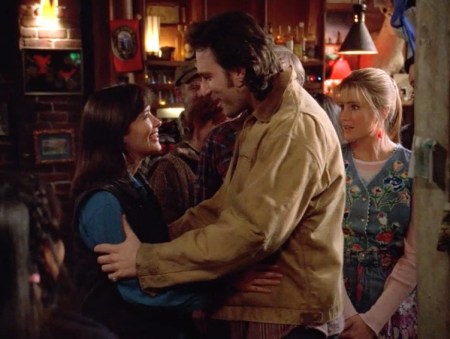
“Buss Stop” is one of those “capsule” episodes where it is its own entity, largely separated from the rest of the season’s stories (or so it seems). While it tells the story of the town’s production of the American classic “Bus Stop” from the beginning to end, it nevertheless pokes at characters’ pressure points to reveal larger truths about the people we’ve come to know and love.
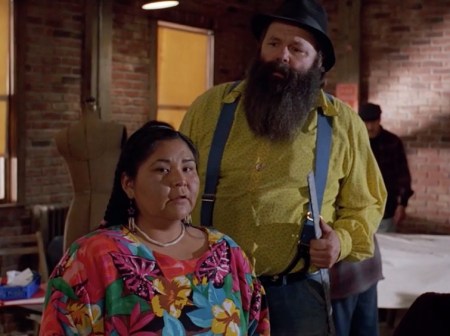
Searching for a Role
Both Michelle and Erick enthusiastically take on their roles as director and the sheriff (respectively), throwing themselves wholeheartedly into production. Both see the play as an opportunity to pursue a once discarded passion: we learn that Michelle was a theatre major and Erick was once an actor who was in a few small plays. Both never made it big; both believe that they prematurely abandoned the craft. They question their own identity and how they ended up in Cicely; both seem to have followed their partners and are still searching for their true passion.
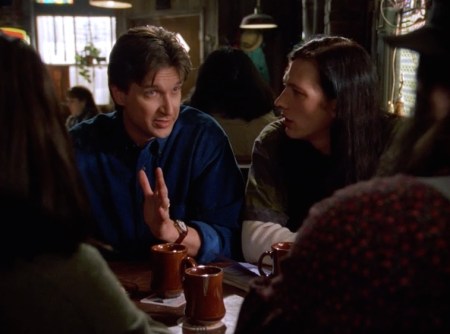
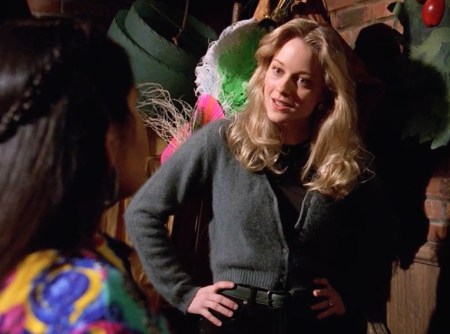
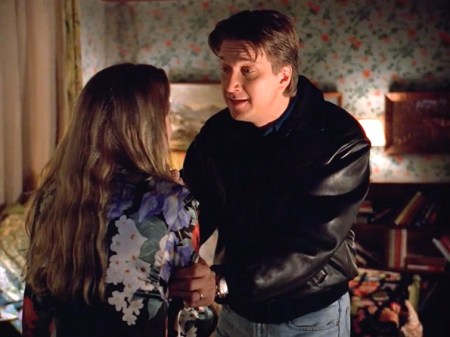
However, Michelle is bombarded with troubles even before production and has her integrity tested by a convenient bribe by Ron. She encounters egos, people second-guessing her casting choices, along with an unruly and unwilling cast. The project that was supposed to have clarified her goals and desires further led her to (literal) darkness, and through a trapdoor into a hole.
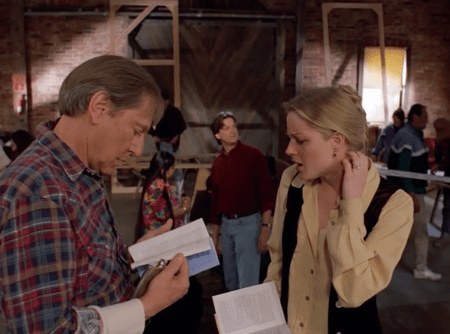
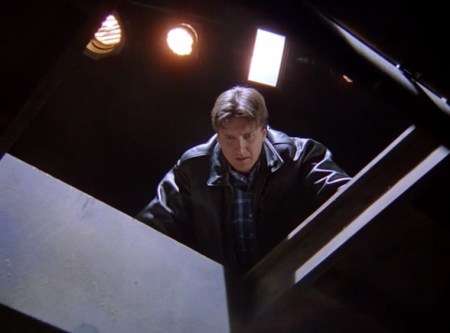
Ron is confronted with the truth that his part was bought, and questions his own talent and capabilities. He seems to have abandoned the ‘actor’ role and his idea of returning to Seattle to join a theatre company there. In the end, it is the idea of the theatre that brings him back to the stage. He recognizes that despite his questioning of his talent and feelings of hopelessness, he is “theatre people,” and theatre people need do what they do.
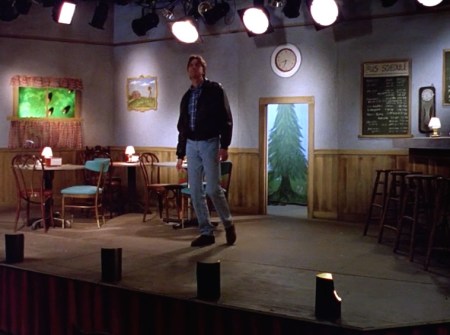
The Kiss
For Chris, the blurring of acting and reality comes to the forefront. In the first rehearsal of the kissing scene between Cherie and Bo, Chris is suddenly stuck with the meaning of the lines, “When you kiss someone for serious, it’s kind of scary, ain’t it?” He is unable to actually kiss her, even in character as “Bo”. Later on, he explains: “It’s her. It’s Maggie. It’s Maggie O’Connell.”
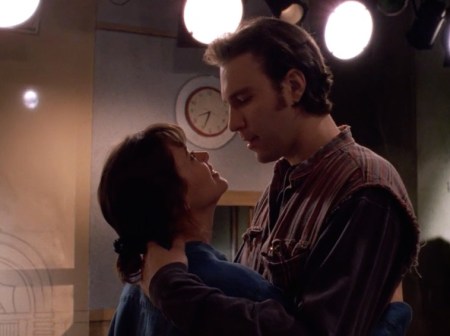
These scenes have much significance beyond this episode. Throughout season six, we have seen Chris struggle with his sudden attraction to Maggie, in episodes “Realpolitik,”Lucky People,” and “Balls.” He is examining his noncommittal love life, having had many girlfriends but never a long-term partner, and he is looking at his future. In the distillery scene, he declares to Erick and Holling:
“Now I know that Bo may have some intimacy issues, but I’m here to ask you, what’s the big deal? What’s he afraid of? Love…I am not afraid of love…Let me tell you two something right now. I might not have an under-one-roof kind of thing going on in my life, but you call any of ’em, you call any of the women I’ve been carnally involved with, and they will tell you not a peep about whether I had to look ’em in the eye. They didn’t care if I looked ’em in the eye. Now, I gotta look ’em in the eye.”
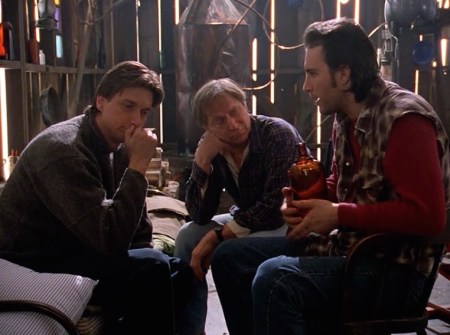
Faced with Maggie’s rewriting of the play in which both Bo and Cherie end up leading separate independent lives, Chris forces himself to go through with the play, as much for art as for himself. He is able to face the truth about himself and set those fears of intimacy aside for now.
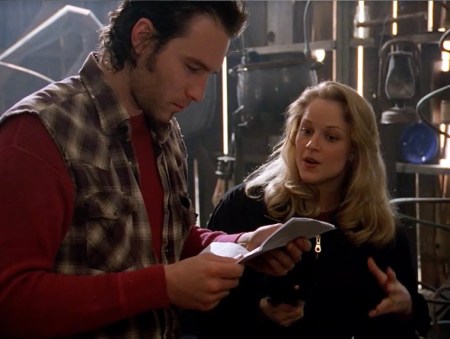
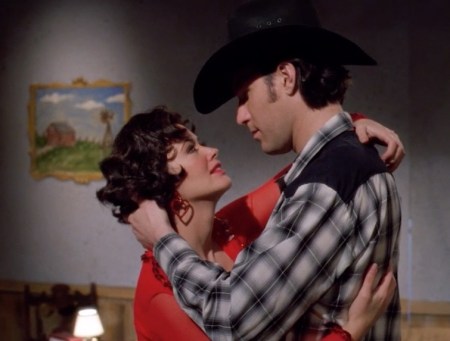
Of course, with the whole conflict being about a kiss, we can’t help but remember episode 2.2 “The Big Kiss.” There were no issues with both of them kissing at that time, so what has changed? In “Buss Stop” the kissing is “for real” and “serious,” and real love is involved. A kiss becomes more than just a kiss, it becomes commitment, intimacy, partnership.
Themes: Theatre, art/life, love, the past.
The Good: The cinematography by Gordon Lonsdale is noteworthy in this episode, as the camera rotates, swirls, and curves around the actors to create a very immediate, palpable effect on the audience. It’s as if we become part of the production. We also loved the self-conscious and “bad” acting that the actors had to do for these dual parts. As well, the relationship of Ron and Erick was a definite highlight, as we get a deeper glimpse of the power dynamics of their relationship.
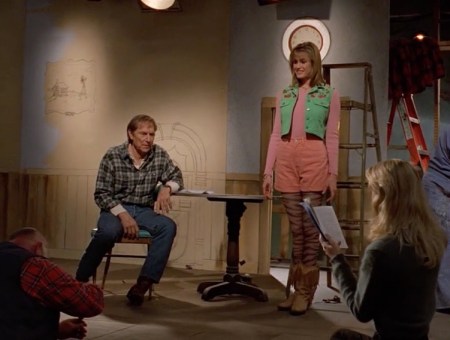
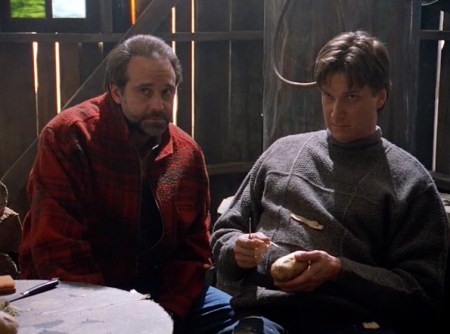
The Bad: Bo is a terrible character and we didn’t like the way he spoke, and the line “Well, golly, when you kiss someone for serious, it’s kind of scary, ain’t it?” still haunts us today. All in all, the play wasn’t particularly enjoyable although we obviously loved the behind-the-scenes production of it.
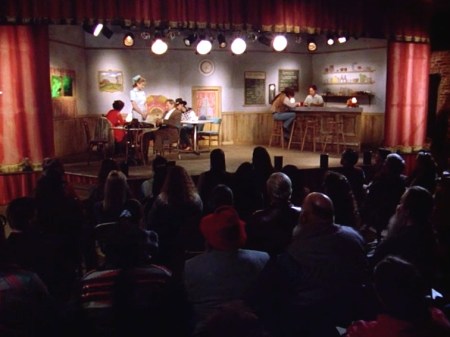
The Notable: We’re not sure why there is an extra “s” in “Buss Stop.” Also it amuses us that there is a scene where Holling eats a piece of lime. We wonder, was that scripted? Or was that just John Cullum’s love of sour things?
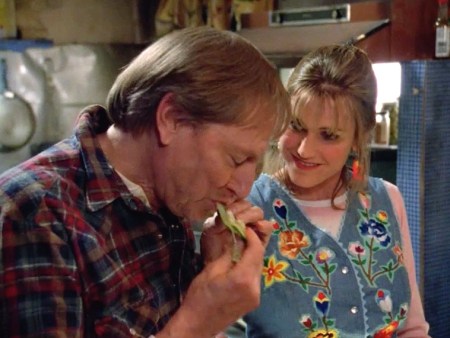
On’s Rating: 8 out of 10
Hazel’s Rating: 7.5 out of 10
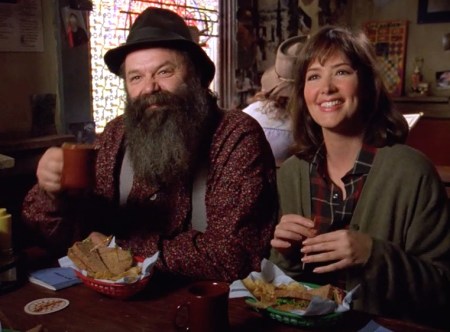






buss
bəs/Submit
NORTH AMERICANarchaicinformal
noun
noun: buss; plural noun: busses
1.
a kiss.
verb
verb: buss; 3rd person present: busses; past tense: bussed; past participle: bussed; gerund or present participle: bussing
1.
kiss.
Origin
Wow, this is informative. Buss means kiss, huh? Interesting and it makes sense now. Thanks!